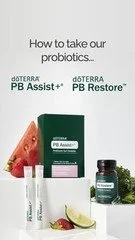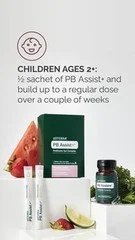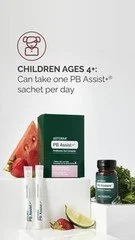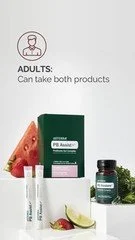The Good Gut
Malaise…..the feeling that comes with a lack of interest in doing much, of being tired, of just not feeling the best. We’ve all experienced that, and when malaise takes over it’s a good reason to make an appointment with your health provider. But, sometimes, feelings of malaise can be as simple as the need to pay attention to the Good Gut. Shout it out! PROBIOTICS!
A probiotic is a type of live microorganism, typically bacteria or yeast, that provides health benefits when consumed in adequate amounts. Probiotics are often referred to as “good” or “beneficial” bacteria because they help maintain a healthy balance of microorganisms in the gut. This balance is crucial for digestive health, immune function, and overall well-being. It’s all about the good gut!
Probiotics offer several potential health benefits, including:
1. Digestive Health: Probiotics help maintain a healthy balance of gut bacteria, which can prevent and treat diarrhea, including diarrhea caused by antibiotics. They may also help with symptoms of IBS, inflammatory bowel disease (IBD), and other digestive disorders.
2. Immune Function: Probiotics can enhance immune function by promoting the production of natural antibodies and boosting the activity of immune cells.
3. Mental Health: Emerging research suggests a link between gut health and mental health, often referred to as the gut-brain axis. Probiotics may help alleviate symptoms of anxiety, depression, and other mental health conditions.
4. Heart Health: Some probiotics may help lower blood pressure and cholesterol levels, contributing to heart health.
5. Skin Health: Probiotics may help with certain skin conditions, such as eczema and acne, by improving gut health and reducing inflammation.
Do I need to take supplements to ensure I’m getting an adequate supply of probtiotics? Well, not really. There are some really interesting food choices that can boost your probiotic levels. Fermented foods, for example, naturally contain probiotics. Some really awesome probiotic choices include:
Fermented Dairy Products
Yogurt: Made from milk fermented by probiotic bacteria, typically Lactobacillus and Bifidobacterium.
Kefir: A fermented milk drink made using kefir grains, which contain a mixture of bacteria and yeast.
Fermented Vegetables
Sauerkraut: Fermented cabbage that contains lactic acid bacteria.
Kimchi: A traditional Korean dish made from fermented vegetables, usually cabbage and radishes, with a variety of seasonings.
Fermented Soy Products
Miso: A Japanese seasoning produced by fermenting soybeans with salt and koji (a type of fungus).
Tempeh: A fermented soybean product that forms a firm, cake-like consistency.
Fermented Beverages
Kombucha: A fermented tea drink made with a symbiotic culture of bacteria and yeast (SCOBY).
Other Fermented Foods
Pickles: Cucumbers fermented in a brine solution with lactic acid bacteria. It’s important to note that not all pickles are fermented; some are simply preserved in vinegar.
Natto: A traditional Japanese food made from fermented soybeans, known for its strong flavor and sticky texture.
Specialty Foods
Buttermilk: Traditional buttermilk, the liquid left after churning butter, can contain probiotics. However, most commercial buttermilk is cultured with lactic acid bacteria.
Cheese: Certain types of cheese, such as gouda, mozzarella, cheddar, and cottage cheese, can contain probiotics if they are made with live cultures and not pasteurized after fermentation.
Non-Dairy Probiotic Foods
Sourdough Bread: Made using a fermented dough starter that contains lactobacilli and wild yeast.
Fermented Condiments: Some condiments like traditional soy sauce and certain hot sauces are fermented and can contain probiotics.
Probiotic Supplements:
Sometimes, even with the best of diets, a little supplement help is needed. This is especially true for individuals who have difficulty maintaining a healthy diet and for those with special diet needs. Probiotic supplements can be beneficial for a wide range of individuals, particularly those with specific health conditions or needs. Here are some groups of people who might consider taking probiotic supplements:
Individuals with Digestive Disorders
Irritable Bowel Syndrome (IBS): Probiotics can help alleviate symptoms such as bloating, gas, and irregular bowel movements.
Inflammatory Bowel Disease (IBD): Conditions like Crohn’s disease and ulcerative colitis may benefit from the gut-balancing effects of probiotics.
Diarrhea: Probiotics can be particularly helpful for preventing and treating antibiotic-associated diarrhea and infectious diarrhea.
Those Taking Antibiotics
Antibiotics can disrupt the natural balance of gut bacteria. Probiotic supplements can help restore this balance and prevent antibiotic-associated diarrhea.
Individuals with Weakened Immune Systems
Immune SupportProbiotics can enhance immune function, making them beneficial for individuals with weakened immune systems or those prone to infections.
People with Skin Conditions
Eczema and Acne: Some research suggests that probiotics can help manage skin conditions by improving gut health and reducing inflammation.
Individuals with Allergies
Allergic Reactions: Probiotics may help reduce the severity of allergic reactions and improve overall immune response.
Travelers
Travelers’ Diarrhea: Probiotics can help prevent and reduce the severity of travelers’ diarrhea by maintaining a healthy gut microbiota.
Probiotic supplements are available in various forms, such as capsules, tablets, powders, and liquid formulations. Supplements can provide specific strains and doses of probiotics that may not be as easily obtained through diet alone. I recommend doTERRA probiotic supplements because of doTERRA’s track record for pure and natural products. They are easy to take and safe for all ages.
In all, doTERRA probiotic supplements can be particularly beneficial for individuals with digestive disorders, those taking antibiotics, people with weakened immune systems, individuals with certain skin conditions, and others looking to improve their gut health and overall well-being. However, it is always advisable to consult with a healthcare provider to determine the most appropriate and safe use of probiotics for your specific health needs. As always, I’m here to help you on your wellness journey. Feel free to contact me should you have any questions regarding your health and wellness. I’m always here for you. sheila@floridaoilsrn.com
Sheila Tucker is an RN with more than 20 years of critical care experience.











